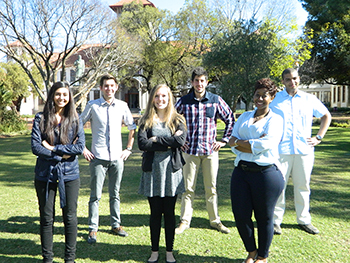Latest News Archive
Please select Category, Year, and then Month to display items
12 October 2020
|
Story Arina Engelbrecht
|
Photo Supplied
 Arina Engelbrecht from Organisational Development and Employee Well-being believes physical activity has a number of benefits for one’s health, including stress relief.
Arina Engelbrecht from Organisational Development and Employee Well-being believes physical activity has a number of benefits for one’s health, including stress relief.
Being physically active plays a big role in preventing the development of mental-health problems and in improving the quality of life of people experiencing mental-health problems.
Treatment for depression
Physical activity can be an alternative treatment for depression. It can be used as a stand-alone treatment or in combination with medication and/or psychological therapy. It promotes all kinds of changes in the brain, including neural growth, reduced inflammation, and new activity patterns are formed that promote feelings of calm and well-being. It releases endorphins – powerful chemicals in the brain that energise your spirit and make you feel good.
Physical activity can be very effective in relieving stress. Research in adults has found that physically active individuals tend to have lower stress levels compared to individuals who are less active. It also leads to improved sleep. When a person sleeps better and feels more rested, overall quality of life improves. They cope better with daily life stressors.
Reduce Alzheimer's risk
Regular physical activity can reduce your risk of developing Alzheimer's disease by up to 50%. It can also slow down further deterioration in those who have already started to develop cognitive problems. It stimulates the brain’s ability to maintain old connections as well as to make new ones.
A study asked people to rate their mood immediately after periods of physical activity (e.g. going for a walk/run, cycling, doing housework) and periods of inactivity (e.g. reading a book or watching television). Researchers found that participants felt more content, more awake, and calmer after being physically active compared to after periods of inactivity.
In conclusion, people who are physically active feel a sense of well-being, feel more energetic throughout the day, sleep better at night, have sharper memories, and feel more relaxed and positive about themselves and their lives.
“Being physically active not only changes your body, it changes your mind,
attitude, and your mood.” – Arina Engelbrecht
UFS 2015 group for Stanford Sophomore College announced
2015-06-09

Photo (from left to right):
Farzaana Adam, Cornel Vermaak, Anje Venter, Tristan van der Spuy, Precious Mokwala and Naushad Mayat. |
Six second-year students from the UFS were selected to attend a two-week seminar at the Stanford Sophomore College in August/September 2015.
The Stanford Sophomore College (SoCo) is an immersive learning experience. Participants attend class meetings during the morning while afternoons include class activities, explorations of Stanford University (USA), field trips, and other organised events.
Since 2012 UFS students have been invited to apply. This year’s successful applicants were recently announced. They are:
• Farzaana Adam
B. Accounting student
Attending the SoCo seminar on Great Ideas in Computer
• Naushad Mayat
Medicine student
Attending the SoCo seminar on HIV/AIDS Epidemics
• Precious Mokwala
Social Sciences student
Attending the SoCo seminar on Photography: Truth or Fiction
• Tristan van der Spuy
B. Accounting student
Attending the SoCo seminar on A Walk Down Wall Street
• Anje Venter
Actuarial Science student
Attending the SoCo seminar on New Millenium Mix: Cross between Race and Culture
• Cornel Vermaak
Medicine student
Attending the SoCo seminar on The Intersection between Arts and Science
SoCo group of 2014 announement:
http://www.ufs.ac.za/templates/news-archive-item?news=4019
2012:
http://www.ufs.ac.za/templates/news-archive-item?news=2344